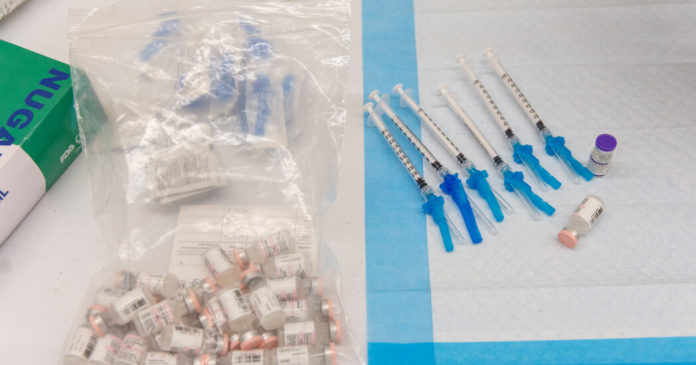Some people getting their initial shots of the Pfizer-BioNTech and Moderna coronavirus vaccines should consider waiting longer for their second dose, according to guidance the Centers for Disease Control and Prevention updated on Tuesday. The agency now suggests an eight-week interval between the first and second shots of those vaccines for some people older than 12, especially boys and men between 12 to 39 years.
The new change, which does not affect those who have already been vaccinated, applies to about 33 million unvaccinated people. And the C.D.C. still recommends the original intervals — three weeks for Pfizer-BioNTech and four for Moderna — for certain people including those whose immune systems are moderately to severely immunocompromised, are 65 years or older, or are at risk of severe Covid.
The change comes in light of research showing the longer interval between doses can increase vaccine effectiveness and reduce the risk of a serious but uncommon side effect called myocarditis, or inflammation of the heart. The overall incidence of post-vaccine myocarditis is low. A study conducted in Israel estimated that nearly 11 of every 100,000 males between 16 and 29 developed myocarditis.
Earlier this month, an independent panel of scientific advisers to the C.D.C. reviewed research on myocarditis that supported an extended interval between doses. Research has shown that adolescent boys and young adult men have an increased risk of developing these heart problems after receiving their second dose of a Pfizer-BioNTech or Moderna vaccine.
Still, the absolute risk of myocarditis is very small, most cases are mild and short-lived, and research shows a coronavirus infection is much more likely to cause heart problems than a Covid-19 vaccine. Patients of all ages infected with the virus had nearly 16 times the risk for myocarditis than uninfected patients, according to a C.D.C. report.
People who waited six to 14 weeks between the first two doses of Pfizer-BioNTech or Moderna vaccines had higher antibody responses than those who waited a standard three or four weeks, according to a C.D.C. report presentation from the meeting. And the vaccines’ effectiveness against infection and hospitalization was also higher with an interval of six to eight weeks between the doses.
When the vaccines first rolled out, the priority was to fully vaccinate people as quickly as possible, according to the presentation. Now, more than a year into the U.S. vaccination campaign, more data has become available to guide vaccination schedules, the presentation noted.
Public health experts say a longer interval between doses means there is a risk of people getting infected after just one shot. But they say this change could sway some unvaccinated people and parents who are concerned about the potential risk of myocarditis.
At the panel’s meeting, Dr. Matthew Daley, a senior investigator at Kaiser Permanente in Colorado and a member of the advisory committee, said that “If the message is, ‘We already have a highly effective and highly safe vaccine or vaccines, and this is an approach to make them even safer,’ that might convince some folks.”
Benjamin Mueller contributed reporting.
Credit: Source link

















